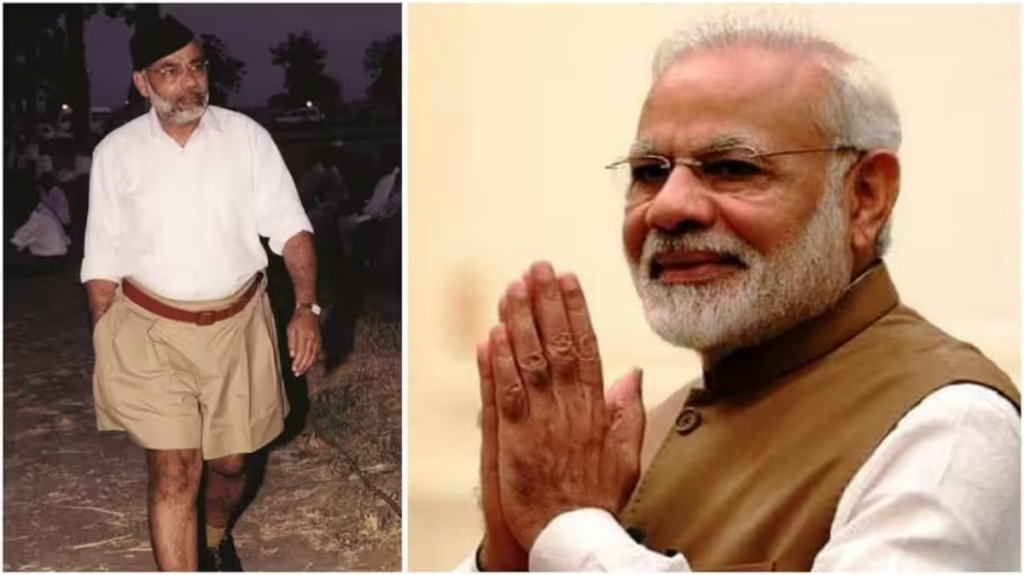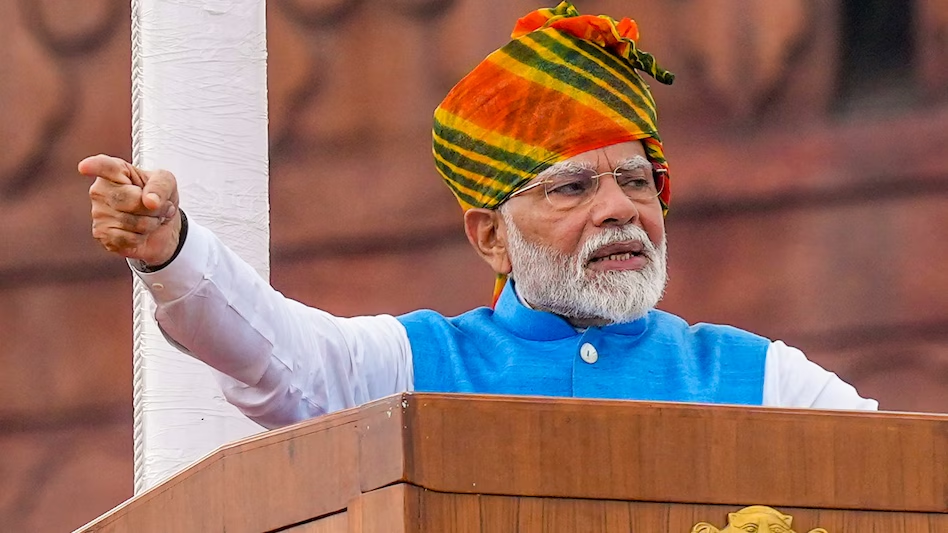PM Modi’s 75th Birthday – On September 17, 2025, Narendra Modi, India’s Prime Minister since 2014, celebrates his 75th birthday. His career, from a tea seller in Gujarat to leading 1.4 billion people, is a story of ambition but overshadowed by controversies that paint him as a divisive figure. From the 2002 Gujarat riots, Haren Pandya’s murder, Mansi Soni Snoopgate, IPS Sanjiv Bhatt’s accusations, misleading speeches, the 2005 US visa ban, Sohrabuddin Sheikh’s fake encounter, to personal scandals like his disputed marriage and alleged fake degree, Modi’s journey sparks fierce debate. Critics accuse him of bending truth, suppressing rivals, and fueling division; supporters see a bold reformer. In simple words, like a chat over chai, let’s dive into Modi’s controversial career and why it keeps India divided on his big day.
Early Life: A Humble Start Marred by Birth Date Doubts

Narendra Damodardas Modi was born in Vadnagar, Gujarat, to a modest family. His father, Damodardas, ran a tea stall where young Narendra helped. His mother, Hiraben, raised six children, with Modi as the third. A curious boy, he loved reading and debating, balancing school with work. He earned a Master’s in political science from Gujarat University. Joining the Rashtriya Swayamsevak Sangh (RSS) as a teen, he learned discipline and patriotism. During the 1975 Emergency, he worked secretly for the opposition, showing early courage.
Yet, controversy shadows even this. His birth date, officially September 17, 1950, is questioned. Some opposition claims cite school records suggesting 1949, though no solid proof exists. This fuels debates about his transparency, setting the stage for a career rife with distrust.
Personal Controversies: Marriage, Education, and Early Scrutiny

Modi’s personal life feeds his controversial image. At 17, he was reportedly married to Jashodaben, a schoolteacher, in an arranged marriage. He left soon after for RSS work, living separately. Until 2014, he didn’t mention her publicly, leading to accusations of secrecy. Supporters call it a sacrifice; critics see it as a lack of transparency that taints his credibility.
His education stirs similar doubts. Modi claims a Bachelor’s from Delhi University and a Master’s from Gujarat University. In 2016, AAP’s Arvind Kejriwal alleged the Delhi degree was fake, citing unclear records. The university confirmed its authenticity, but doubts persist, used to question his early integrity. These personal scandals set the tone for a career where truth is often contested.
Political Rise: Gujarat Power and Rising Rivalries
Modi joined the BJP in the 1980s, becoming Gujarat’s Chief Minister in 2001. His “Gujarat Model” brought industries, roads, and power, earning some praise. But controversies—riots, murders, surveillance, and fake encounters—defined his tenure. In 2014, he led the BJP to a massive Lok Sabha win, becoming Prime Minister. He won again in 2019 and 2024, a rare three-term run for a non-Congress leader. Even in 2024, needing allies for a majority, his leadership held strong. Yet, his Gujarat years remain the epicenter of his controversial career.

Achievements: Progress Amid the Shadows
Modi’s career has wins, though often eclipsed. “Make in India” boosted jobs, making India the fifth-largest economy. Swachh Bharat Abhiyan built millions of toilets, curbing open defecation. PM Jan Dhan Yojana gave bank accounts to the poor, and PM Kisan aids farmers with Rs 6,000 yearly. During COVID, India sent vaccines to over 100 countries. Digital India brought internet to villages, and PM Awas Yojana housed over 4 crore families. The 2020 Ram Temple in Ayodhya fulfilled a Hindu dream.
Modi’s global outreach strengthened ties with the US, UAE, and others. His approval ratings often top 60%, and he’s served over 4,000 days as PM, third only to Nehru and Indira Gandhi. From farmers in Punjab to shopkeepers in Kerala, his schemes bring change. But controversies, especially his alleged lies and political scandals, keep these in the shadows.
Controversies: The Heart of Modi’s Divisive Career
Modi’s career is defined by controversies, with misleading speeches and political scandals at the forefront, painting a picture of a leader accused of twisting truth and consolidating power. Critics highlight repeated instances of false or exaggerated claims in his speeches. In 2019, Modi claimed India conducted the world’s first cloud-seeding experiment to evade Pakistani radar during the Balakot airstrike, debunked by scientists as implausible. He’s stated ancient India invented plastic surgery, citing Lord Ganesha’s elephant head, a mythological claim critics call unscientific. In 2020, he claimed India’s COVID-19 recovery rate was among the world’s best, ignoring high infection rates and underreported deaths, disputed by fact-checkers. His 2016 demonetization speech promised to eradicate black money, yet 99% of banned notes returned to banks, contradicting the goal. Modi’s claims of creating millions of jobs under Make in India were challenged by data showing unemployment at a 45-year high in 2018. He’s also accused of historical distortions, like claiming Jawaharlal Nehru ignored Sardar Patel’s legacy, contradicted by records of Nehru’s tributes. In 2023, Modi claimed India led global climate efforts, but reports showed rising coal dependency, undermining his narrative. These instances fuel accusations that Modi uses misleading rhetoric to shape public perception and bolster his image.
Political controversies add weight to his divisive legacy. The 2002 Gujarat riots, during his time as Chief Minister, saw over 1,000 deaths, mostly Muslims, after a train fire killed 59 Hindus. Critics say he didn’t act fast enough, though courts cleared him. A 2023 BBC documentary revisiting the riots was banned in India, with raids on BBC offices, raising censorship concerns. The 2005 US visa ban, citing Modi’s role in the riots, marked him as a global pariah until 2014, when it was lifted after his PM win, highlighting his controversial reputation abroad.

The Haren Pandya murder case is a dark chapter. Pandya, a BJP rival and former Gujarat Home Minister, was shot dead in 2003 in Ahmedabad. A vocal critic of Modi’s riot handling, Pandya had testified against him. His family accused Modi of denying security despite threats and alleged political involvement, calling it a “political murder.” Courts convicted 12 in 2019, but the probe was criticized as botched, with links to other encounters like Sohrabuddin Sheikh’s.
The Sohrabuddin Sheikh fake encounter case further stains Modi’s Gujarat tenure. In 2005, Sheikh, a suspected criminal, was killed by Gujarat police in a staged encounter. Investigations revealed his wife, Kauser Bi, was also killed and cremated to destroy evidence. The CBI implicated Amit Shah, Modi’s close aide, though he was acquitted in 2014. Critics allege Modi’s administration shielded extrajudicial killings, with the case linked to Pandya’s murder through shared police officers.
The 2009 Snoopgate scandal involving Mansi Soni, a young architect, adds intrigue. Tapes revealed Gujarat police, under Amit Shah, surveilled her 24/7, including phone tapping, on orders from “Saheb” (allegedly Modi). Claims of personal interest arose; BJP said it was protection requested by her father, Pranlal Soni. Soni reportedly fled to the US, and the scandal fueled allegations of Modi misusing state machinery.
IPS Sanjiv Bhatt’s saga highlights alleged suppression. Bhatt, a senior Gujarat officer, filed a 2011 affidavit accusing Modi of instructing police on February 27, 2002, to allow Hindus to “vent their anger” post-Godhra, enabling riots. Bhatt claimed he briefed Modi on threats, including to Gulberg Society. The SIT dismissed his claims, but Bhatt stood by them. He was suspended in 2011, dismissed in 2015, and sentenced to life in 2019 for a 1990 custodial death, which critics call fabricated to silence him. Bhatt alleged Modi and Shah pressured him to destroy Pandya murder evidence, with his family claiming persecution.
The 2017 Doklam standoff with China saw Modi claim a diplomatic victory, but reports later confirmed Chinese troops retained control, contradicting his narrative. The 2016 demonetization caused chaos—long queues, job losses, and a slowed economy, despite Modi’s success claims. The 2019 Citizenship Amendment Act (CAA), favoring non-Muslim refugees, sparked protests for being anti-secular. Scrapping Article 370 in Kashmir (2019) was cheered by some but criticized for harsh measures like internet shutdowns. Farm laws in 2020-21, later withdrawn, were seen as pro-corporate.
Media curbs, activist arrests in 2018, and 2024 electoral misconduct claims by Rahul Gandhi (dismissed by courts) fuel democratic concerns. GST (2017) hurt small businesses, and unemployment and inflation remain issues. Modi’s Hindu nationalist stance, tied to the RSS and BJP, raises fears of minority marginalization.
Personal controversies—his unreported marriage, alleged fake degree, and unclear birth date—cement Modi as a leader whose truthfulness and accountability are questioned, making his career a heated village debate where sides are fiercely drawn.
Birthday 2025: Service Amid a Controversial Legacy
Modi’s 75th birthday is marked as “Sewa Diwas.” From September 17 to October 2, “Sewa Pakhwada” includes cleanliness drives and health camps. He’ll launch a textile park in Madhya Pradesh and attend “Modi Mahotsav” in Delhi, focusing on India’s 2047 goals. Past birthdays, like 2020’s COVID relief, show his service focus. He may visit Bihar, pushing “Viksit Bharat.” Yet, his controversial career overshadows these efforts, raising questions about truth and power. Celebrations include blood donation camps, rangolis by schoolchildren, and greetings from global leaders like US President Donald Trump and Bollywood stars.

A Career of Boldness and Battles
Modi is like strong masala chai—bold but not for all. His rise from a tea stall to PM inspires some, with glimpses of progress in economy, cleanliness, and global ties. But his controversial career—from riots, murders, snooping, fake encounters, Bhatt’s fate, to misleading speeches and divisive policies—dominates, fueling doubts about truth and accountability. On his 75th birthday, as India reflects, let’s hope for unity over division. What’s your view? Share below.
FAQs
When is Narendra Modi’s birthday, and why the confusion?
Officially, Modi was born on September 17, 1950, turning 75 in 2025. Some claim 1949 based on school records, but no proof confirms this, sparking transparency debates.
What are Modi’s key achievements?
He launched Make in India, Swachh Bharat, PM Jan Dhan, PM Kisan, and housed millions via PM Awas Yojana. India sent COVID vaccines globally and built the Ram Temple—wins overshadowed by controversies.
Why is Modi’s marriage controversial?
Married to Jashodaben at 17, Modi left for RSS work and didn’t mention her until 2014. Critics call it secrecy; supporters see it as sacrifice, fueling doubts.
Is Modi’s degree fake?
Modi claims degrees from Delhi and Gujarat Universities. AAP’s 2016 claim of a fake Delhi degree was refuted, but doubts persist, questioning his credibility.
What is the Haren Pandya murder controversy?
In 2003, BJP rival Haren Pandya was shot dead in Ahmedabad. His family accused Modi of denying security and political involvement, linking it to Pandya’s riots criticism. Courts convicted 12, but the probe was called botched.
What is the Mansi Soni Snoopgate controversy?
In 2009, architect Mansi Soni was allegedly surveilled 24/7 by Gujarat police on Modi’s orders. Claims suggest personal interest; BJP said it was protection. Soni reportedly fled to the US.
What are IPS Sanjiv Bhatt’s controversies with Modi?
Bhatt’s 2011 affidavit accused Modi of enabling 2002 riots. Dismissed in 2015 and sentenced to life in 2019 for a 1990 case, critics say he was framed to silence him.
How has Modi been accused of misleading speeches?
Modi’s claims—like cloud-seeding in Balakot, ancient plastic surgery, COVID recovery, job creation, Nehru’s legacy, and climate leadership—have been debunked, with critics accusing him of distorting facts for political gain.
What are Modi’s other political controversies?
The 2005 US visa ban for riots, Sohrabuddin Sheikh’s 2005 fake encounter, and Doklam standoff misrepresentations join riots, demonetization, CAA, Article 370, farm laws, media curbs, and activist arrests in his divisive career.
How does Modi celebrate his birthday?
“Sewa Diwas” includes health camps and cleanliness drives. In 2025, he’ll launch a textile park and attend events for India’s 2047 vision, amid his controversial legacy.
How many times has Modi won elections?
He was Gujarat CM from 2001 and PM in 2014, 2019, and 2024—three consecutive terms, rare for a non-Congress leader, despite controversies.

